A Conversation With John Marco
by Claire E. White
Bestselling fantasy author John Marco first burst upon the fantasy scene in 1999 with the
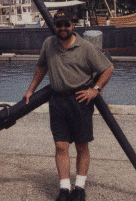
|
A technical writer by training, John left a successful corporate career to pursue his lifelong dream of writing. His work is known for its fascinating characters, interesting ethical dilemmas and creative new fantasy worlds. His latest release is The Eyes of God (Daw). The Eyes of God is an epic fantasy which begins with an Arthurian plot: the wise and peaceful King Akeela makes peace as forcefully as his father waged war. But the wife he takes, Queen Cassandra, becomes the focus of a tragic love triangle between Akeela, Cassandra, and Akeela's best friend Lukien, the Bronze Knight. But in classic John Marco fashion, the story has many unusual twists and turns; part of the fun of reading his books is trying to anticipate where the plot will take you. Lukien is sent on a quest to the land of Jador to find The Eyes of God, two amulets with special powers. But the quest is just the beginning of this tale, which is replete with adventure, romance, magic and court intrigue.
We talked with John about his new book, how success in his new career has changed his life, and why the fantasy genre is so popular now.
Since our last interview, you have completed the Tyrants and Kings trilogy, and now published a new book, The Eyes of God. How does it feel to be the author of four major fantasies now and to have your work be critically acclaimed? How has it changed your life?
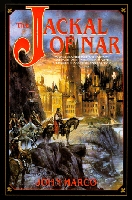
|
I'd like to talk about your new release, The Eyes of God. How did this book come about? What was your inspiration?
Actually, The Eyes of God was conceived around the time of my first book, The Jackal of Nar. I had just sold that book to Bantam, and wasn't sure at that point if I'd be writing a sequel or not. Eventually I did write two sequels, but before that I outlined the entire plot for The Eyes of God. I wasn't sure when I would actually write the book, though, because not soon after that things changed. I got a new agent, my publishers wanted sequels to The Jackal of Nar, and The Eyes of God got pushed off. Pushed off, I say, but never pushed away, because it was always there waiting for me, and I was always looking forward to writing it.
In this case, the inspiration for the story bears little resemblance to the finished product. It was just an idea for some characters. Originally, I had wanted to write about a group of old soldiers who were haunted by something they did in the past, something that in the present, years later, they're unable to escape. And basically that was it. For some reason that idea stuck in my mind and inspired me. If you look closely at the plot of Eyes, you can see echoes of that original idea running through it. But writing a book means that things have to change, and the original inspiration transformed into something bigger.
The plot of the book is quite interesting and unusual for a fantasy novel: there is a quest, but most of the book deals with the consequences of the quest. Was this intentional? How did you approach the plot for this book?
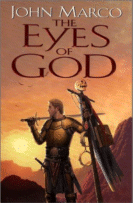
|
After that, the plot takes on a number of twists -- at least I hope it does -- and becomes a bit less predictable. This is where all the actions of the characters that have gone before really start to have consequences.
One of the main characters is King Akeela. Akeela changes quite a bit during the book; certainly there are tragic elements in his life story. How did you create the character of Akeela? He seems like a difficult character to write.
In every book that I write I have a favorite character.
| "I'm not a romance writer, obviously, so creating a believable love story is always a challenge for me. There's no particular device I know of to make a romance believable. The only thing I know I did was to ask myself why these characters love each other. Why? It's probably the most important question, and if I answer it well enough readers will believe. And if they believe, they will feel." |
To be honest, I didn't find him hard to write. That may be because I liked him so much. Readers might find that strange, but I genuinely like Akeela. Liking him made him easy to get to know and understand, and once you know a character writing about him or her becomes much easier. I see Akeela as a paranoid, Nixon-like ruler who's thinking is so rigid it ruins him. It's the faults that interest me most in characters, not their virtues.
Akeela's friend, Lukien, is another interesting character who seems to weather life's storms quite a bit better than his friend Akeela. What issues did you consider when you created Lukien?
Yes, Lukien is much stronger than Akeela, no question. He's had to be strong to survive. The story goes that he was orphaned at a young age, and had to survive on his own on the streets of a big city. Up to that point, he hasn't been handed anything. Unlike Akeela, his life has been very difficult. That kind of experience is bound to make you strong, if you have the heart for it, which Lukien does.
Unfortunately, Lukien's troubles stem from a deep-rooted jealousy of Akeela. Even though the two become like brothers, Lukien is never considered a royal. Rather, he's always an outsider, no matter how close he gets to the royal family. Over the years that eats at him quietly, because he's so close to the things he wants, like respect. My idea was for Lukien to be the kind of person that always questions himself, that never quite feels as good as everyone else, no matter how much he accomplishes.
One of the things that is so interesting about your books is that the storylines are never predictable -- you always have a different way of looking at things. Even a classic love triangle, such as that of Lancelot, Guinevere and King Arthur becomes something new and different in this book. How did you approach writing this unusual love story?
Well first off, let me say that I'm glad you find the stories unpredictable. That's a nice compliment. It may be that I have a different way of looking at things; I don't know. I do try to imagine things in a different way, though I'm sure that's what all writers do. But if it turns out that my books are unpredictable or surprising, I'm happy.
In the case of the love triangle in Eyes, there's no question that the classic King Arthur tale was a big influence. That's fairly obvious, I know, but that's okay. It's a great story, everyone can recognize it and relate to it, and it's just the kind of starting point I wanted for my story. I love the Camelot story. I love the way it starts off with such promise, but ends in sadness. That's the kind of feeling I hope to generate in The Eyes of God, that sense of squandered potential.
I'm not a romance writer, obviously, so creating a believable love story is always a challenge for me. That was especially true in this book, because it has such a strong romantic element. It needs to be credible, because the rest of the story hinges on it. But I don't have any specific techniques to create a romance in a story. There's no particular device I know of to make a romance believable. The only thing I know I did was to ask myself why these characters love each other. Why? It's probably the most important question, and if I answer it well enough readers will believe. And if they believe, they will feel.
The answers to this question are different for each of the three characters, of course. Akeela has his own sad reasons for loving Cassandra so much, as does Lukien. And Cassandra's reasons for choosing Lukien over Akeela are also explored in the book. It's this interplay of motivations that makes the romance work, hopefully.
Queen Cassandra is certainly one of the driving forces in the book. She's a complex character who manages to remain sympathetic, even though she betrays her husband. What was the greatest challenge in creating Cassandra? Were there any traits you were specifically trying to avoid with her?
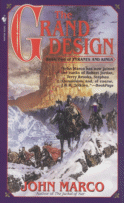
|
Cassandra was fun for me. She's a young, beautiful woman when the book starts out, and so she's very appealing in a kind of standard, fantasy trope way. She's the beautiful princess that longs to be away from her father and start a new life for herself. But she also has a streak of ambition which causes her problems. She wants to be away from her father so badly that she's willing to make some bad decisions to make that happen. Plus, she's been surrounded by well-bred men all her life. What she really wants is to fall in love with someone a bit rougher. Someone, not coincidentally, like Lukien. That's when the trouble really starts.
As far as traits I needed to avoid in creating Cassandra, there was one thing in particular I needed to keep in mind -- not making her too naïve. My editor Betsy Wollheim helped me with this one. After she read the first version of the book, she pointed out that Cassandra was a bit too innocent. After all, here she is the beautiful princess with men always staring at her. How could she not notice this, or be aware of her own beauty? That criticism made a lot of sense to me, so I went back and worked on Cassandra and made her more worldly. I think she's a much better character because of that one perceptive comment.
A very entertaining character is Figgis, the librarian. With Figgis, we seem to see the beginnings of the advance of technology in this world. Did you think about Figgis as the comic relief in the book? He is quite irreverent at times.
Figgis was one of the more fun characters to right about. He's actually a fairly secondary character, which made him somewhat easier to write about, and unlike most of the other characters in the book Figgis doesn't have a dark side, or at least not one that we see. I never thought of him as the comic relief before, but now that I think about it I would say that's correct -- when he's on stage, the tension is lessened. He lets the reader have that pause to catch their breath, because they know nothing horrible is going to happen. Maybe he'll give them a chance to smile or to wonder, and in a "heavy" book that's a good thing.
As you mentioned, Figgis is also the character that brings technology into the world. In the world of Nar, from my first series of books, technology was already well established and out in the open. But in this new series, the world hasn't seen much technology yet. It's just starting to blossom, and Figgis is like a Leonardo DiVinci -- he's a real renaissance man, into all kinds of things. Not only is he a librarian, he's also an inventor and astronomer. Because he is into so many different things, I was able to have fun with him and explore these "new" technologies through the eyes of someone that sees everything as wondrous.
The Eyes of God deals more directly with magic than did the Tyrants and King series. How did you approach the magical system for this world?
Right from the start, I wanted The Eyes of God to be more magical than the Tyrants and Kings books. For one thing, magic is the central element that makes fantasy different from science fiction or other genres, and there are those who feel that the Tyrants and Kings books are too light on magic. That was done deliberately, because I'm not the kind of reader that goes in for a lot of magic myself, and so my books reflect that preference. And even though magic plays a great role in the new book then it had in my previous books, it's still not overwhelming; it's still part of the background, sort of an herb flavoring the soup, which is how I like it.
One thing that's always interested me is the idea of life after death. I'm fascinated by this concept and always have been, and so the magic in this new book is based on a spirit world, the notion that we don't simply disappear when we die but rather can still influence this world. In The Eyes of God, the source of the magic is a long dead race called the Akari who have chosen to communicate with a group of particular individuals in order to help them. These people are aided in extraordinary ways by the Akari, while the Akari get the benefit of being able to remain in the living world. I liked this element of mutual benefit.
The book also deals with some very interesting social issues. For example, the Inhumans and their treatment in society. What attracted you to writing about this subject?
| "I just write about what interests me. Desert cultures interest me, for instance, so that's why I created Jador. When you're interested in something, you're more likely to pay attention to details, to spend time on it and not feel rushed. I hope my worlds come alive for people. If they do, it's probably because the reader is participating in my own fascinations." |
This whole element of the book was something I knew I'd have to be careful about, and so I tried hard not to sound preachy. I just wanted to explore the idea that everyone -- no matter their problems -- has some sort of gifts within them. Everyone has something they can do better than others. And if you're given a tough set of circumstances to overcome, there is a way to do so. You just have to find it. I've been lucky in this respect; I've never had anything particularly terrible that I've had to overcome. Maybe that makes me unqualified to make this argument, I'm not sure. Still, I think it's a worthwhile idea, and it gives me pleasure to write about it.
What were your influences when writing about the land of Jador? About the fortress of Grimhold?
Jador came to me because I wanted to write about a desert kingdom. The idea is that the characters have to quest across a desert in search of the Eyes of God, and their trek leads them to Jador, which is a beautiful city of gleaming white minarets and mosaic temples. Before starting the book, I actually bought myself a coffee table book about Morocco. It's filled with big, beautiful, colorful pictures of that country, and I used that as my inspiration. Historically and culturally I didn't worry too much about drawing close comparisons, because that's not really what I was after. Mostly, I just wanted to incorporate the feel of the architecture. I did take some elements from different desert cultures to create the Jadori, but the people of the city are just an amalgam of ideas.
Grimhold, on the other hand, is a complete fabrication, and isn't based on anything in reality at all. Grimhold is the fairy-tale aspect of the book. When the book starts out, Grimhold is considered just a legend, a place that everyone has heard of but nobody truly believes exists. Supposedly, it's a place where monsters live, and the legend is that its ruled by a witch that steals children. In reality (at least the reality of the book), Grimhold is where the Inhumans live. Because of their odd appearance, they are considered monsters by some, but of course they're just regular people. The secrets of Grimhold unfold throughout the course of the book. Finally, at the end, it's all fully revealed.
As with your other books, The Eyes of God has very exciting and well-drawn battle scenes. How do you plot out your battle scenes? Do you visualize them, or even act out the hand to hand combat scenes?
You know, it always surprises me when I get this question, because I don't actually take a great deal of time planning out my battle scenes. I will say that I enjoy them thoroughly, and maybe that's why I am able to just throw myself into them without too much planning. Basically, I just visualize the whole thing, and hold it in my head while I put it down on paper. Occasionally I might make some crude drawings to help me remember the positions of the combatants or whatever, but mostly it just flows from my mind. The key is to get it all down on paper in one sitting! I've learned the hard way that if I leave off writing a battle scene in the middle, I'll probably forget the details of what's going on in it.
The ending certainly leaves the door open for sequels; will there be a sequel to the book? Can you give us a sneak peek or a hint?
Sequel? Sure. This is fantasy, after all -- the land of sequels! Sometimes that's a good thing, and sometimes not. Personally, I try to keep the number of sequels down a bit compared to some fantasy authors, but I do like writing about the same characters and places more than just once. So I've already started on the sequel to The Eyes of God, and have so far sold the rights to it in the U.S. and U.K.
The sequel is called The Devil's Armor. I don't want to give anything away, but for those who read the first book they will know exactly to what the title refers. Most of the same characters from the first book will be back in the second, and some of them will take on greater roles this time. There are also a few new characters for readers to meet.
At this point, I'm about 150 pages into the writing of the book, and I think it will turn out to be a shade darker than The Eyes of God. The title can attest to that, I suppose. I know that I have to be careful because I don't want the book to be too dark. The first book has an overall upbeat quality that I want to continue in the sequel.
I'd like to talk about the mechanics of writing for you. Would you take us through a typical writing day for you?
For me, a typical day of writing is pretty much like a typical day at any desk job, except that I don't have the distractions of meetings or other people around me. I basically work from nine to five, making sure to take a number of breaks throughout the course of the day. This kind of routine is really necessary for me. I like the structure. Without it, I'm not sure I'd get much work done.
Also, I don't have a set amount of words or pages that I try to write in a day. I've heard that some writers have a target that they try to hit each day, but that's how I approach it, because each day is different. I have days when I write a lot, but there are also days when my output is only a couple of pages. It really depends on the scene I am writing.
One thing I like about being a full-time author now is not having to work on weekends. I rarely do that anymore, because I have enough time during the week to get my work done. It's really a great blessing, because working full-time while trying to write a book is exceedingly grinding.
Have you ever faced writer's block? If so, how did you deal with it?
To be honest, this infamous malady is not something I ever face. In fact, I can't actually recall ever having writer's block. I heard a quote recently -- I can't remember exactly how it goes or who said it -- but it basically stated that writers who are blocked simply aren't ready to start writing yet. When I heard that, a little light went off, because that's exactly how I feel about writing.
Before I begin any book, I outline the entire thing. That way, I know pretty much the whole story before I start writing. I would say that this is the biggest reason I never experience writers block -- there's simply no reason for me to feel blocked. I know what needs be done, so I'm not spending a lot of energy worrying about it, wondering what direction the book should take.
I'd like to talk about world building. How do you approach building a new fantasy world? What are some of the elements that you consider?
Honestly, there are fantasy writers far more adept at creating fantasy worlds than I am. World-building is certainly an important part of the process, and I do the best I can to make my worlds feel real, but I'm not one of those writers that sweats over every detail, spending a lot of time on creating languages and things like that. For me, these details seem to come out during the actual writing process, and not in the planning our outline stages. When I set out to write a new book, I have an idea of the settings of course, but it's sort of general, more of a feeling than anything concrete. Then, as I start writing, I pause every now and then to look around, and I ask myself what it is that I'm seeing. And that's how my worlds evolve. Also, I have the luxury of having a lot of pages to work with, and that's probably a big factor in making the settings believable. After so many pages, you're just bound to have a lot of details in there.
Mostly, I think I just write about what interests me. Desert cultures interest me, for instance, so that's why I created Jador. When you're interested in something, you're more likely to pay attention to details, to spend time on it and not feel rushed. I hope my worlds come alive for people. If they do, it's probably because the reader is participating in my own fascinations.
What was the most challenging aspect of writing this novel?
Probably the biggest challenge for me was striking a balance between new and old. While writing The Eyes of God, I was very aware of every similarity the book has to the books that I've written before. Those who have read the Tyrants and Kings books will find many of the same themes popping up in this new book. I wanted that, because I didn't want to do something completely new and alienate my loyal readers. On the other hand, I certainly didn't want to go over the same ground again. It was tough, and in the final analysis it won't be me deciding how well I succeeded -- it will by my readers.
The other challenge I had was handling the time span of the book. The story for The Eyes of God takes place over about sixteen years, and that posed some difficulties. I had to remember that people age and change over the course of so many years. Plus, the settings had to change. It was like I had to create all of them twice -- once in the beginning, and then again sixteen years later, showing all the ways that things have changed. It's the kind of challenge that's both fun and difficult at the same time.
How would you say you have evolved as a writer since the publication of your first book?
I like to think I've gotten better. I certainly hope I have. Writing my first book was much more difficult for me than any of the subsequent books have been. I feel as though I've found my voice over the course of the last three books. For example, I know that I enjoy using multiple viewpoint characters, and that's something that all my books have. It took me some time to find the right way of doing this, but I'm comfortable with it now.
Also, I'm much more at ease now with simply being a writer. I'm enjoying it more than I used to, because I'm less stressed out over the whole thing. In the beginning, it was important simply to get books on the shelves and to get noticed in such a crowded field of peers. Now, though, I'm more at ease with the slow pace of the publishing industry. I take a little more time when writing my books. That way, I enjoy the process more.
What is your opinion of ebooks? Will they replace paper books in the future?
God, I hope not. I would hate to see ebooks replace paper books. I have nothing against them, I suppose. In fact, I think that my publisher is planning to put out an ebook version of The Eyes of God. I would like to see it when it's done, but I don't think I'd ever want to read a book like that. I'm old fashioned, I guess. I want to feel the book in my hands. Besides that, books are beautiful things. What's beautiful about a handheld device?
As a genre, fantasy has really come into its own lately, especially with the release of the film versions of Harry Potter and The Lord of the Rings. Why do you think people seem more interested in the fantasy genre right now?
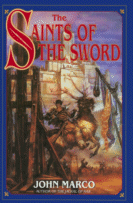
|
More from Writers Write
Stephen King Quotes
quotes from the master
quotes from the master
Grammar Tips
improve your writing
improve your writing
Writing Prompts
spark your creativity
spark your creativity
